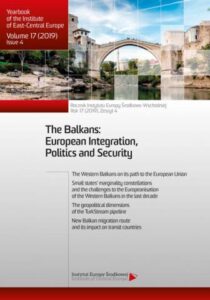The Western Balkans on its path to the European Union
CEFTA Statistical Portal, Trade in goods, https://statistics.cefta.int/goods [15.10.2019].
Council of the European Union, Sofia Declaration, 17.05.2017, https://www.consilium.europa.eu/media/34776/sofia-declaration_en.pdf [02.12.2019].
Džankić J., Keil S., Kmezić M. (eds), The Europeisation of the Western Balkans: A Failure of EU Conditionality?, Cham 2019.
European Commission Press Release, EU-Western Balkans Summit Thessaloniki, 21.06.2003, http://europa.eu/rapid/press-release_PRES-03-163_en.htm [02.10.2019].
European Commission Press Release, Western Balkans: Regional Economic Area, 12.07.2017, https://europa.eu/rapid/press-release_MEMO-17-1967_en.htm [02.12.2019].
European Commission, A credible enlargement perspective for and enhanced EU engagement with the Western Balkans, 06.02.2018, https://ec.europa.eu/commission/sites/beta-political/files/communication-credible-enlargement-perspective-western-balkans_en.pdf [24.11.2019].
European Commission, Enlargement Strategy and Main Challenges 2011-2012, 2011, https://ec.europa.eu/neighbourhood-enlargement/sites/near/files/pdf/key_documents/2011/package/strategy_paper_2011_en.pdf [24.11.2019].
European Commission, EU-Western Balkans Six Flagships Initiatives, May 2018, https://ec.europa.eu/commission/sites/beta-political/files/sixflagship-initiatives-support-transformation-western-balkans_en.pdf [03.12.2019].
European Commission, Montenegro 2019 Report, 2019, https://ec.europa.eu/neighbourhood-enlargement/sites/near/files/20190529-montenegro-report.pdf [02.12.2019].
European Commission, North Macedonia 2019 Report, 2019, https://ec.europa.eu/neighbourhood-enlargement/sites/near/files/20190529-north-macedonia-report.pdf [02.12.2019].
European Commission, Serbia 2019 Report, 2019, https://ec.europa.eu/neighbourhood-enlargement/sites/near/files/20190529-serbia-report.pdf [02.12.2019].
Medjak V. (ed.), Twelve Proposals for EU Enlargement from the Western Balkans, Belgrade 2018.
Mojsovska S., Effects of Stabilisation and Association Agreements and CEFTA 2006 on Republic of Macedonia, [in:] V. Medjak et al., Effects of Stabilisation and Association Agreements and CEFTA 2006 on WB6 European
Integration and Regional Cooperation: Achievements and ways forward, Belgrade 2018.
Mojsovska S., Политиката на ЕУ кон Западниот Балкан: несомнена поддршка и анемичен процес на евроинтеграции [Politikata na EU kon Zapadniot Balkan: nesomnena poddrška i anemičen proces na evrointegracii], „Respublica” 2017, http://respublica.edu.mk/blog/2017-03-22-11-09-24 [14.10.2019].
Regional Cooperation Council, Multi-annual Action Plan for a Regional Economic Area in the Western Balkans (MAP REA), https://www.rcc.int/priority_areas/39/multi-annual-action-plan-for-a-regional-economic-area-
in-the-western-balkans–map [04.10.2019].
Regional Cooperation Council, Regional Investment Reform Agenda for the Western Balkans Six, 11.05.2018, https://www.rcc.int/docs/410/regional-investment-reform-agenda-for-the-western-balkans-six [04.10.2019].
The Berlin Process. Information and Resource Centre, Berlin Process, https://berlinprocess.info/about/ [04.10.2019].


